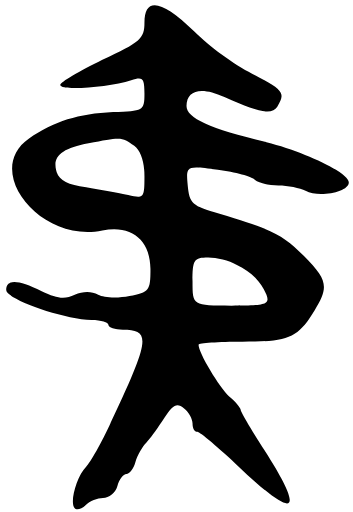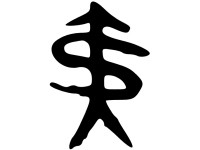Hexagram 36 is called Ming Yi 明夷, Brightness Hiding or Brightness Wounded. The double meaning of ‘Yi’ here (a completely different word to the name of the book) allows the hexagram name to contain a whole story: when wounded, you hide; once bitten, twice shy.
It also means something ordinary, smooth, level, and barbarian tribes – the ones who might wound you, as you can imagine from the ancient character, which shows a great man with (merging with?) a bow:

The ‘Yi’ character appears twice more in the book, in 55.4 and 59.4. It turns out that these three occurrences are connected both thematically and structurally.
In both 55.4 and 59.4, ‘Yi’ refers to specific people – the Yi barbarians:
‘Feng is screened off
Hexagram 55 line 4
At midday, seeing the Dipper.
Meeting your Yi lord,
Good fortune.’
‘Dispersing your flock,
Hexagram 59, line 4
From the source, good fortune.
Dispersing gains the hilltop,
No barbarian [Yi] has occasion to think of this.’
55.4 changes to 36: this is the Brightness Hiding moment of Abundance, at the garrison of Feng. Here, the light can be fully hidden, fear and threat may dominate, but you can still see the Dipper. (The nearest English equivalent might be ‘see your true North’.)
The line goes still further, with the extraordinary implication that you might make an ally of the Yi lord, despite all he represents: fear, wounding, oppression, the darkening of the light. It’s a real challenge to find how such a meeting can be ‘good fortune’, one I grappled with before.
Hexagram 59, Dispersing, is the opposite of 55 – different at every line:
Hence 59.4 is the opposite of 55.4 – though another, maybe more interesting way of putting this is to say that changing every line of 59 except this one leads 59 back to 36:
In other words, 59.4 is exactly how not to reach 36. This line’s about the perfect antithesis of barbarity: something, it says, that the barbarians couldn’t even imagine.
What could this be?
The trigrams of Hexagram 59 show wind above water, stirring and evaporating it. So line 4 would be the moment when the water has just become water vapour and begun to rise into the wind. It’s undergone a change of state, and a change of direction.
Disperse your flock, says the line, and gain the hilltop. Remember the atmosphere of Hexagram 36: you’re under threat, you could be hurt (again); you hide. If the barbarians are invading, wouldn’t it make sense to round up your flocks into a defensible enclosure and do your best to hide them?
Perhaps – but it probably makes perfect sense to the barbarians, too. Whereas if your flock is dispersed, there’s nothing for them to attack – in fact, there’s no flock at all, just some scattered sheep. If you’re not gathering your possessions together and holding on, there’s no target: you’re not available to be oppressed. This is the line with no connection to Hexagram 36.
Another way to see the shift in thinking here: it’s recognising that what you treated as a noun is really just a verb. The classic example is a fist: ‘fist’ is a noun, an object, like ‘book’ or ‘brick’. Only… books and bricks don’t disappear, but relax your hand, and where has the fist gone?
Flocks could be the same, and so could any ‘possession’ or ‘position’: it exists for as long as someone holds it, and if no-one holds it, it’s not a possession or position any more. Ice melts, water evaporates, things change state and turn out to be ways of acting, and not at all the ‘things’ they’d become in your mental shorthand. Hexagram 59 in action.
Dispersing gains the hilltop: it rises. Yi-thinking – barbarian thinking, ‘levelled’ thinking – can’t conceive of that extra dimension.











This is so good! Love the part on how not to 36, 59.4. Have you used this is in a “how to” direction? Wonderful insight.
Not yet, really, no. Instead I’m left looking back through past readings to imagine what I might have done differently if I’d noticed this then!
Reading the lines of 55 does describe someone that is hiding , at least in Alfred Huangs version. Are they just connected because of only one line difference?
Structurally, yes, that’s the connection: the hexagrams are just one line apart.
Thank you ! i didn’t notice at first that the Yi character was on the line itself not the hexagram as a whole. Interesting, and hexagram 59 line 4 would lead to 6 , the opposite of 36.
Just a comprehensive description on Wikipedia: https://en.wikipedia.org/wiki/Four_Barbarians